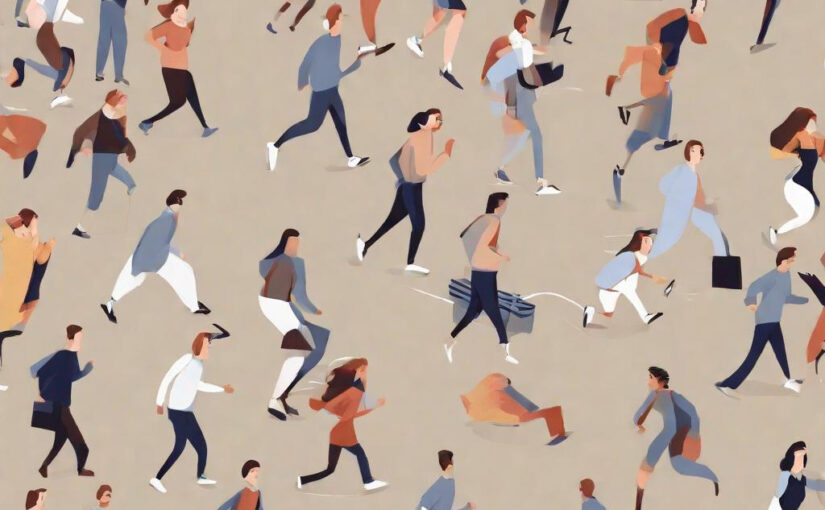I have captured the state of our society in a few words in an AI image instruction. AI can draw in seconds what politics no longer wants to deal with today because it seems too complex. As a prompt, I entered: „A group of different people, expecting order, running around in a mess“.
As a negative prompt, i.e. what the image should not depict, I entered: „social order, peace, creative will“.
In a Tik-Tok world of emotionalised messages, how can we create an alert society that is capable of proactively dealing with the preservation of our pre-digital achievements in the digital world?
After more than 20 years of misguided uncontrolled digitalisation, it is no longer about progress, but at least for us Germans, it is first and foremost about preserving a society that became a global model for radical renewal after the Second World War. It was the many individuals who no longer wanted war and made Germany what it was before digitalisation.
But just like in the AI picture, there are many who simply carry on as if nothing has changed, while others are weighed down by a ball and chain that prevents them from moving forward. Others simply disappear into a hole without anyone noticing, or they bury their heads in the sand.
The Left and the SPD are increasingly losing the image of the capitalist as the enemy. This is because most medium-sized companies no longer serve as the enemy in the global world, which is shaped by the digital players. Data capitalists are out of reach for the trade unions. The work of many people and the added value of a few are becoming increasingly disconnected from each other.
The Greens are finally being taken seriously with their environmental issues. But they do not offer any convincing solutions. Many people want to preserve the environment, but do not feel involved when it comes to initiatives for heat pumps and wind turbines. What is missing is a decentralised approach that focuses on the energy autonomy of the individual and supports their sense of responsibility with incentives.
The FDP is still a beacon of hope at the moment. At least someone has to uphold civil rights. But here too, there is a lack of will to actively shape a digital society in the short time remaining. Social value creation can only be achieved decentrally by many. To do this, every citizen must have a real key and the power of disposal over his digital data as his property. I have proven in an overall concept that it would be easy to take everyone into a digital society. But without being able to protect someone like me when I want to implement such concepts, the preservation of pre-digital achievements such as diversity and civic engagement in the digital world will fail. The economy will not fix it alone.
The CDU has always attracted those who want to make money. Here you get help to continue on your way without falling into a hole. But you can only distance yourself further from actively shaping a digital society if you are openly pursuing a concept that is hostile to democracy.
The new parties must first prove whether they can implement well-thought-out concepts in a difficult social environment. Visions alone no longer move anything.
If more people in the East are turning their backs on the concept of democracy than in the West, it is simply because they have not experienced many good democratic years and were overtaken by a digital society at an early stage. Socialist systems were smashed and there was not enough time for many to find their own way.
Digitally unstructured democracies are no longer determined by social necessities, but by globally scalable business models in the interests of the few.
And yet it is precisely digitalisation that makes it possible to overcome spatial boundaries. With the right participation concepts, East Germans would not have a locational disadvantage.
In the same way, we could counter demographic change as an active immigration country by having digital probationers in their home country prepare for their participation in our society. Current social frictional losses due to migration could be avoided by social integration abroad.
A large proportion of the disinformation and cyber attacks would be avoided if all citizens had the opportunity to evaluate information that has been newly added to the Trusted WEB 4.0 in a democratic process. If every digital offender could be clearly identified, the cyber spook would quickly come to an end.
But to achieve this, a will to shape the future is needed to maintain democratic social order and peace in Germany. If politics only reacts to pressure, the democracies will have disintegrated from within as a result of further digitalisation before countermeasures are even taken.
